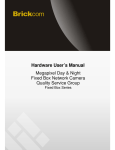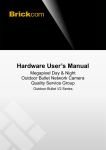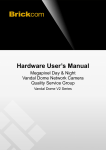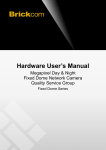Download Brickcom FB-130NP
Transcript
Hardware User’s Manual Megapixel Day & Night Fixed Box Network Camera Quality Service Group Fixed Box Series 0 Review History: 1. Separate User Manual into HW and SW. 2. Merge FB-100Ap/FB-100Ae/FB-130Np Series into this User Manual. 3. Merge FocusEasy™ version Product name: Network Camera (Fixed Box series) Release Date: 2013/07 Manual Revision: V4.0 Web site: www.brickcom.com Email: [email protected] [email protected] © 2013 Brickcom Corporation. All Rights Reserved 1 Table of Contents Before You Use This Product ..................................................................... 3 Regulatory Information ............................................................................ 4 Chapter 1- Package Contents .................................................................... 5 Chapter 2- Fixed Box Network Camera Overview ........................................... 6 Chapter 3-LED Behavior ........................................................................... 7 Chapter 5- Installation ............................................................................ 11 5.1 Hardware Installation............................................................................................ 11 5.2 System Requirements .......................................................................................... 13 5.3 Camera Connection .............................................................................................. 14 2 Before You Use This Product In many countries, there are laws prohibiting or restricting the use of surveillance devices. This Network Camera is a high-performance, web-ready camera which can be part of a flexible surveillance system. It is user’s responsibility to ensure that the operation of this camera is legal before installing this unit for its intended use. Upon opening the product’s package, verify that all the accessories listed on the “Package Contents” are included. Before installing the Network Camera, read the warnings in the “Easy Installation Guide” to avoid misuse. When installing the Network Camera, carefully read and follow the instructions in the “Installation” chapters to avoid damages due to faulty assembly or installation. 3 Regulatory Information Federal Communication Commission Interference Statement This equipment has been tested and found to comply with the limits for a Class B digital device, pursuant to Part 15 of the FCC Rules. These limits are designed to provide reasonable protection against harmful interference in a residential installation. This equipment generates uses and can radiate radio frequency energy and, if not installed and used in accordance with the instructions, may cause harmful interference to radio communications. However, there is no guarantee that interference will not occur in a particular installation. If this equipment does cause harmful interference to radio or television reception, which can be determined by turning the equipment off and on, the user is encouraged to try to correct the interference by one of the following measures: - Reorient or relocate the receiving antenna. - Increase the separation between the equipment and receiver. - Connect the equipment into an outlet on a circuit different from that to which the receiver is connected. - Consult the dealer or an experienced radio/TV technician for help. FCC Caution: Any changes or modifications not expressly approved by the party responsible for compliance could void the user’s authority to operate this equipment. This device complies with Part 15 of the FCC Rules. Operation is subject to the following two conditions: (1) This device may not cause harmful interference, and (2) this device must accept any interference received, including interference that may cause undesired operation. IMPORTANT NOTE : FCC Radiation Exposure Statement : This equipment complies with FCC radiation exposure limits set forth for an uncontrolled environment. This equipment should be installed and operated with minimum distance 20cm between the radiator & your body. This transmitter must not be co-located or operating in conjunction with any other antenna or transmitter. The availability of some specific channels and/or operational frequency bands are country dependent and are firmware programmed at the factory to match the intended destination. The firmware setting is not accessible by the end user. 4 Chapter 1- Package Contents Please check to make sure that the product package contains all the accessories listed below. a. Network Camera b. CS mount Lens (Optional) c. Product CD d. Camera Stand e. Warranty Card f. Allen Key g. Power Adapter (Optional) h. Easy Installation Guide i. Detachable Antenna (Optional) 5 Chapter 2- Fixed Box Network Camera Overview The Brickcom Fixed Box series offers a reliable and efficient solution for 24-hour video surveillance. The Fixed Box series offers highly efficient H.264 video compression, which reduces bandwidth and storage requirements without compromising image quality. M-JPEG and MPEG-4 are also supported for flexibility. With the megapixel progressive sensor and removable IR-cut Filter, this series delivers extremely clear and detailed images that CCTV cameras cannot offer. The internal SD/SDHC memory card slot allows for local storage, which prevents data loss if the data connection is lost. Users can view live feed anywhere by internet browser or 3G mobile phone. Also, the Fixed Box series can transmit the video to portable devices through other technology, such as WiMax, NAS, Digital Frame and power line. The Fixed Box series receives power through the same cable as for data transmission. This makes installation easy because there is no external power supply needed. For easy setup, the Fixed Box series offers a step-by-step installation package. “Easy Config” makes the configuration simple even for users without an IT background. With IEEE 802.11 a/b/g/n wireless compliance, network installation is not restricted by location or landforms. The Wireless Fixed Box series can be installed in any location with wireless coverage. It can easily be used to cover remote districts and historic spots. In addition to the motion detection function, the Fixed Box advanced Series can also support Intelligent Video Analysis which can be used for applications such as object tracking, people counting, and forbidden region alarm. 6 Chapter 3-LED Indicators Function Front LED Behavior Description WPS in process WPS FocusEasy™ (V2 Series only) Steady WPS Successfully Connected Steady Lens focusing in process Remark Right (Blue) Right (red) Hardware failure Steady Normal Operation Status Unlit Power Off Left (Green) While F/W upgrading Function Rear LED Behavior Flashes Link Unlit Power Steady Unlit 7 Description Blinking while connecting to the network No connection Normal Operation Power off Remark Left (Amber) Right (Green) Chapter 4- Device Appearance Description Photo Indication & Dimension Diagram Status LED Power Connector (AC24V In) Microphone/Line In Ethernet RJ45 10/100 Socket Power Connector (DC12V In) (Link/Power LED embedded) Light Sensor Detachable Antenna (WIFI series) WPS/FocusEasy™ LED WPS Button (WIFI Series) (WIFI series/FocusEasy™ series) SD/SDHC Card Slot Reset Button Extension I/O Terminal Block Audio Out Auto Iris Connector Build-in Microphone NOTE 1. The WPS buttons must first be enabled through the web GUI in order to work. See WPS page for details on how to enable the WPS Button. 2. (*) These are optional features. Please refer to the Product List for the full list of optional features available for the product. CS Mount Lens -Optional <Vari-focal Lens with Manual Iris> --- CS Mount Iris Controller (*) Focus Controller Zoom Controller (*) <Optional Lens> 8 <Vari-focal Lens with Auto Iris> (DC Drive) --- CS Mount Zoom Controller Focus Controller Extension I/O Terminal Block The Network Camera provides an extension I/O terminal block which is used to connect the camera with external input/output devices. The pin definitions are listed as below. Pin 1 2 3 4 5 6 Function Power +5V Digital Output Digital Input Ground RS-485 RS-485 + DI/DO Diagram 9 Hardware Reset Reset Button The Reset Button can be used to reboot the camera or restore it to factory default settings. If the camera experiences a problem, rebooting the camera may correct the problem. If the problem remains, please restore the camera to factory default settings and reinstall the software. To Reboot - Press and hold the Reset Button for one second using a paper clip or thin object. Wait for the camera to reboot. To Restore – Press and hold the Reset Button for ten seconds until the LED light turns off. When successful restored, the LED will be blue during normal operation. Note - By restoring the camera, all settings will be restored to the factory default settings. SD Card Capacity (*) The network camera is compatible with SD/SDHC (Maximum 64GB) cards. (*) These are optional features. Please refer to the Product List for the full list of optional features that are available for this product 10 Chapter 5- Installation 5.1 Hardware Installation Mounting the CS-Mount Lens to the Camera <Vari-focal Lens with Manual Iris> --- Optional Lens 1. Connect the CS-mount lens to the IP camera by turning it clockwise. 2. If necessary, adjust the iris controller, focus controller, and zoom controller to get the best image condition. To adjust the lens: 1. Adapt the iris to current environment by adjusting iris controller (The more the iris is opened, the brighter the scene will be). 2. Adjust zoom controller to decide the customize focal length 3. Adjust the focus controller to adapt the image to the focal length. Focus Adjustment with FocusEasy™ (FocusEasy™ version only) 1. Cover the lens for 3 seconds to black out the image until the buzzer beeps. 2. Adjust the focus and listen to the beeps: The farther the image is from the focus, the slower the beeps are. When the image gets closer to the focus, the beeps go faster, just like the car reverse radar. 11 3. Once the image is focused, the buzzer will make a long beep for 3 seconds for notification. <Vari-focal Lens with Auto Iris> --- Optional Lens 1. Connect the CS-mount lens to the camera by turning it clockwise 2. Plug the lens cable in the side camera connector. 3. If necessary, adjust focus controller, and zoom controller to get the best image condition. To adjust the lens: 1. Adjust zoom controller to decide the focal length. 2. Adjust the focus controller to adapt the image to the focal length. *For further information of vari-focal lens with auto iris, please refer to the supplied lens’ instruction manual. 12 5.2 Minimum System Requirements CPU Pentium 4 3GHz RAM 1024 MB Web Browser Microsoft Internet Explorer 8.0 Operation System Microsoft Windows XP Network Interface 10/100Mbps Network interface card 13 5.3 Camera Connection Note: If there is no DHCP server on the network, the camera will operate with the IP address 192.168.1.245. Please make sure your computer's network interface is configured to the same subnet as the camera. Connection to Non-PoE (Power over Ethernet) Switch or Router 1) Power the camera by plugging the power adaptor to the outlet and the DC jack to the camera. 2) Connect the camera to the switch or router with the RJ-45 Ethernet cable. * Upon power-on, the rear LEDs will be lit. Please refer to the LED indicators instruction (chapter 3) on user manual for the definition of the LED colors. 14 Connection to PoE Switch or Router or Injector A. PoE Switch or Router: 1) Connect the camera to the PoE switch or router with the RJ-45 Ethernet cable. B. PoE injector: 1) Connect the camera to the OUT port ("DATA+Power" port, etc.) of the PoE injector with the RJ-45 Ethernet cable. 2) Connect the IN port ("DATA" port, etc.) of the PoE injector to the switch or router with the RJ-45 Ethernet cable. 3) Connect the PoE injector to the power outlet 15 Software Installation In this manual, "User" refers to whoever has access to the Network Camera, and "Administrator" refers to the person who can configure the camera and grant user to access the camera. After checking the hardware connection, run the Installation Wizard program included on the product’s CD-ROM to automatically search the intranet for the camera. There may be many cameras on the local network. Differentiate the cameras using the serial number which is printed on the labels on the carton and the bottom of the camera. Insert the Installation CD into the CD-ROM driver. Run Auto-Run Tool directly from the CD-ROM to start the installation. When installing the Brickcom software kit for the first time, select a desired language for the interface. The available languages are listed in the scroll box. Click <Install> and follow the steps to install the EasyConfig wizard on the desired computer. 16 In the Install Shield Wizard dialog box, click <Next> to continue. Read the End-User License Agreement and check the option “I accept the terms of the license agreement”. Click <Next> to continue. 17 Select either “Complete” setup or “Custom” to install the system. COMPLETE SETUP (Recommended) Check the option “Complete” and then click <Next>. Click <Change> to change the appointed folder to install. Click <Next> to continue. 18 Shortcut options selection. Click <Next> to continue. The installation information will be displayed. Click <Next> to continue. 19 To launch EasyConfig or PC-NVR Standard, select the application and click <Finish>. When launching the PC-NVR program, please refer to the PC-NVR user manual. CUSTOM SETUP This option is recommended for advanced users. It can be used to install the system to a preferred directory or to select specific program feature(s). Check the option “Custom”, and then click <Next>. 20 Select the features to install. Click <Next> to continue. 21 Click <Change> to change the appointed folder to install. Click <Next> to continue. Select programs to create shortcuts. Click <Next> to continue. 22 The installation information will be displayed. Click <Next> to continue. To launch EasyConfig or PC-NVR Standard, select the application and click <Finish>. When launching the PC-NVR program, please refer to the PC-NVR user manual. 23 EasyConfig To launch EasyConfig, select EasyConfig from the start menu. If Complete Setup type was used in the software installation, an EasyConfig icon was installed on the desktop. Double click to open the icon. If Custom Setup type was used in the software installation and an EasyConfig icon was not installed on the desktop, the program will be installed under C:\Program Files\Brickcom\EasyConfig unless the program was saved to a preferred directory. Click <Start> to continue. The program will automatically search for the camera in the intranet. NOTE - Check “Skip the hardware installation guide” to skip checking the hardware connection. To check the hardware installation settings, do not check the option box. 24 25 Select either “Simple Mode” or “Professional Mode” to obtain the camera’s IP settings. If “Simple Mode” is selected, EasyConfig will set up the connection automatically. On the other hand, user can also configure IP address manually by selecting “Professional Mode” 26 There may be many cameras in the local network. Differentiate the cameras using their UPnP name. Double click on the camera from the survey list to connect. For configuring the IP address settings, select either <Settings remain the same>, <Automatically obtain an IP Address (DHCP) (Recommended option)> or <Set IP Address configuration manually>. 27 If <Set IP Address configuration manually> is selected, the following pages will be displayed. 28 If the camera supports the EasyLink™ function, the following page will be displayed. Otherwise, this page will not be shown. User can also simply skip this step by clicking on “Skip.” EasyLink™ is a unique Brickcom function which allows users to assign a unique EasyLink™ name to their network camera’s IP address. There is no need to configure the router to open up ports or remember hard-to-memorize IP addresses. Users can log onto [uniqueEasyLinkname].mybrickcom.com to view the camera’s web GUI and live view. Enter a unique EasyLink name which length must be between 5-32 characters. When finished, click the arrow button to continue. When the IP address settings have been configured, the screen will either display a successful or failed connection message. If the connection failed, either try again or quit the installation. 29 If “DHCP IP address settings” was selected, the failure page will be displayed as below: If “Static IP address settings” was selected, the failure page will be displayed as below: 30 If the connection was successful, the user will see the message: “Congratulations. The installation of the camera is complete.” When this window is displayed, click <PC-NVR> to start the PC-NVR program, <Live View> to view the live video from the connected IP camera, or <X> in the top right corner of the screen to close the installation window. If the user starts the PC-NVR program, please refer to the PC-NVR user manual. Once installation is complete, the Administrator should proceed to the next section "Accessing the Network Camera" for necessary changes and configurations. 31









































